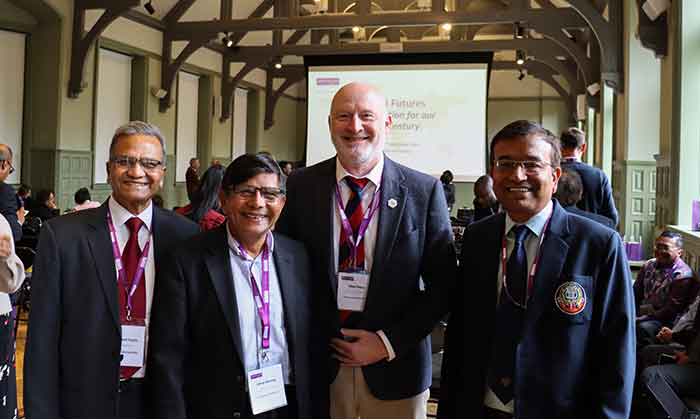Identifying new global health challenges
14 Oct 2024
Four new research questions to improve global health outcomes, co-produced by University researchers and their international partners, discussed at symposium as part of our Bicentenary celebrations.

Leading global health researchers at the University were joined by their international partners for a two-day symposium as part of the Bicentenary celebrations. They explored new opportunities for co-working on solutions for common areas of global unmet health and care need. They sought areas where commonality and collaboration could be harnessed through international research to answer globally relevant questions.
Experts spanning housing, urban planning, health policy, health economics, climate change, pollution, water, agriculture, nutrition, noncommunicable diseases, workforce training, behaviour change and implementation science, were bought together to look holistically at pressing global health challenges that could be addressed though new collaborations. As a result, four research opportunities were identified, which will be taken forward by the international, interdisciplinary teams from 2025.
Initiated by Professor Keith Brennan, Vice Dean Internationalisation at the Faculty of Biology Medicine & Health, the event was an opportunity to reinforce the University's ongoing commitment to improving health outcomes for all and to celebrate, in its bicentennial year, some of the partnerships that are addressing two key challenges highlighted by the World Health Organisation (WHO).
Speaking at the event, which welcomed collaborators from across the globe, Professor Brennan said: ‘The two-challenges set out by the WHO are firstly, that ‘non-communicable diseases are becoming an issue of equity. They disproportionately affect low- and lower-middle-income countries, and in all countries the poorest and most vulnerable are the most at risk and the least likely to have access to treatment.’ Secondly, that ‘there will be a shortfall of between 10 and 14.5 million health workers globally by 2030’.
“As a university interested in addressing global health challenges, the event was designed to bring together key partners to identify commonality and collaboration across different fields and continents and see where change can be achieved by learning from one another.
“As we increasingly inhabit a global village, it is more important than ever that knowledge acquired in one community, is shared and implemented in other communities. Whilst we remain committed to addressing these two important WHO questions, by bringing together our collaborators, with their experience and expertise, the event allowed us the opportunity to draw breath and develop plans for addressing other health challenges as we enter our third century as a research institution.”
The research questions and proposals will be launched and shared from 2025.
Find out more about our impact and innovation in global health.
